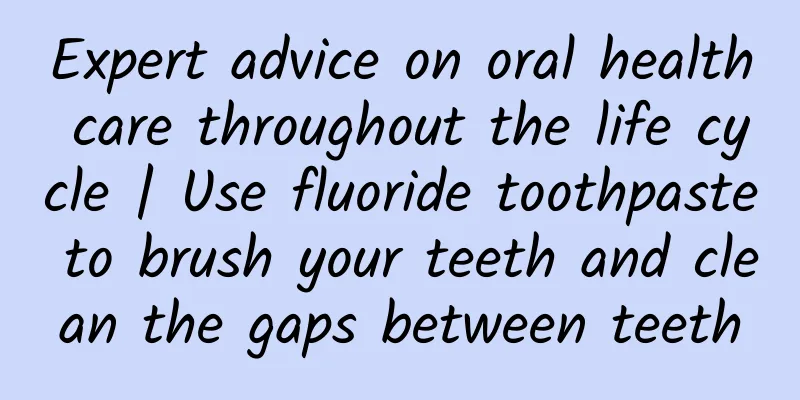Expert advice on oral health care throughout the life cycle | Use fluoride toothpaste to brush your teeth and clean the gaps between teeth

|
Author: Tai Baojun and Liu Chang, Wuhan University Stomatological Hospital Fluoride toothpaste is a functional toothpaste containing fluoride. The fluoride in fluoride toothpaste has the effect of preventing caries. Under normal circumstances, there is a dynamic balance of demineralization and remineralization on the surface of teeth, just like a "balance". If oral hygiene is poor, the bacteria increase, enamel demineralization worsens, the balance tilts towards demineralization, and caries forms. When brushing your teeth with fluoride toothpaste, fluoride can remineralize the enamel that has undergone local early demineralization in time, making the crystal structure of the teeth stronger and less susceptible to acid damage, and the balance gradually returns to balance. Therefore, fluoride toothpaste can help maintain the balance of demineralization and remineralization of enamel, preventing or reversing the occurrence of caries (Figure 1). Figure 1 Schematic diagram of the anti-caries effect of fluoride toothpaste Brushing teeth with fluoride toothpaste is a safe and effective anti-caries measure. When the first deciduous tooth erupts, parents can start brushing their children's teeth with fluoride toothpaste with a fluoride concentration of 500-1100 mg/kg. Infants under 3 years old can use a fluoride toothpaste about the size of a grain of rice each time. After brushing, parents use gauze to remove or tilt the child's head down to spit out the remaining toothpaste in the mouth; children aged 3 to 6 years old use a pea-sized amount of fluoride toothpaste each time. It is recommended that parents check the effect of their children's brushing and insist on helping their children brush their teeth carefully and thoroughly every night; children over 6 years old and adults use toothpaste with a fluoride concentration higher than 1,000 mg/kg to brush their teeth, and use about 0.5 to 1 gram (about 0.5 to 1 cm in length) of fluoride toothpaste each time (Figure 2). It is recommended to brush your teeth at least twice a day, and brushing your teeth before going to bed at night is more important. Figure 2 Schematic diagram of fluoride toothpaste dosage Pregnant women have a higher chance of developing dental caries due to changes in hormone levels, oral environment, eating habits and oral hygiene behaviors. Therefore, pregnant women are advised to use fluoride toothpaste to brush their teeth to prevent dental caries. Elderly people are very likely to develop dental cervical and root caries due to physiological gum atrophy, which exposes tooth roots. Using fluoride toothpaste to brush teeth can effectively prevent dental caries. Brushing teeth is a good self-care method for cleaning teeth, but it cannot clean the gaps between teeth, so it is necessary to use dental floss or an interdental brush to clean the gaps between teeth every day. For people who do not have receding gums or exposed tooth roots, dental floss should be used to clean the gaps between teeth; if the gums have already receded, an interdental brush should be used to clean larger gaps between teeth. It is recommended to use dental floss or an interdental brush to clean the gaps between teeth after each meal, and clean again before going to bed at night. After the deciduous teeth of infants and young children erupt and establish adjacent relationships, parents need to help them use dental floss, and school-age children should take the initiative to learn to use dental floss. When flossing teeth, be careful to be gentle to avoid abrasion between teeth or damage to the gums. Correct use of dental floss can prevent gingivitis and will not widen the gaps between teeth. Figure 3 Use of dental floss Figure 4 Use of interdental brushes (Contributed by the Popular Science Department of the Chinese Stomatological Association and the Oral Preventive Medicine Committee of the Chinese Stomatological Association) |
<<: #千万IP创科学普# Which is healthier, boiling water for drinking or buying bottled water for drinking?
Recommend
Why do I have my period while I am pregnant?
The phenomenon of menstruation is mainly a physic...
What are the symptoms of abnormal pregnancy?
During pregnancy, we all hope to give birth to a ...
The process of restoring the secondary color of the eyebrow
Haze is a cosmetic method for semi-permanently im...
What are the symptoms of antenatal depression?
For women, the happiest moment in life is pregnan...
Can I use a yogurt machine without a lid? What kind of bacteria powder is good for making homemade yogurt?
Yogurt tastes good, but it is not so easy to make...
Spring is here, how can we move scientifically?
As the saying goes, a year's plan starts with...
Is it easy to feel sleepy when you are pregnant?
Everyone knows that when a woman becomes pregnant...
Does pelvic inflammatory disease affect menstruation?
Pelvic inflammatory disease is a disease that gir...
What should normal nipples look like?
What does normal milk and nipple pictures look li...
Let you know how to take care of your stomach
Constipation, bad breath, abnormal tongue coating...
These behaviors of strong women in the workplace actually lead to infertility!
With the progress of the times, more and more wom...
Female lower back pain
In life, many women often feel lower back pain. T...
Pros and cons of NovoSurgery
The Nosocomial procedure is a surgical procedure ...
Ovarian cysts: the "invisible monster" in women's bodies
1. Introduction The ovary is a vital organ for wo...
What to eat to nourish the brain after childbirth?
During pregnancy, a variety of nutrients must be ...









